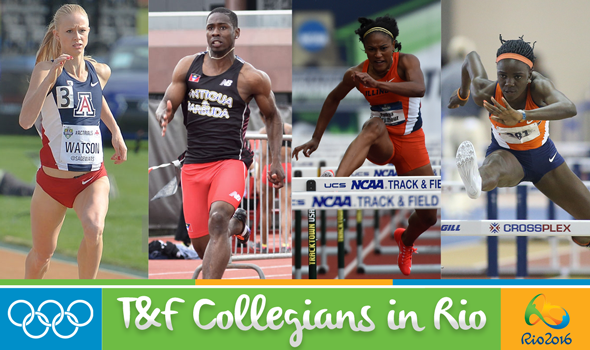
USTFCCCA News & Notes

Potential Collegiate Breakout Stars From Rio
NEW ORLEANS — By the time the 2016 Rio Olympic Games concluded this past weekend, 10 collegians from the 2016 track & field season had won medals either as an individual or part of a relay team.
RECAPPING RIO: By The Numbers | Former Bowerman Winners
Those medalists were headlined by Ryan Crouser and Clayton Murphy, both of whom either exhausted their eligibility (Crouser) or turned professional (Murphy). Crouser won gold in the men’s shot put and set an Olympic record, while Murphy became the first American to medal in the 800 since 1992 with his third-place finish.
Eight others won medals as part of relay teams: Mobolade Ajomale (bronze, 4×100), Morolake Akinosun (gold, 4×100), Fitzroy Dunkley (silver, 4×400), Taylor Ellis-Watson (gold, 4×400), Chrisann Gordon (silver, 4×400), Arman Hall (gold, 4×400), Courtney Okolo (gold, 4×400) and Brendon Rodney (bronze, 4×100).
But what about those collegians who didn’t medal?
Who set themselves up for success in the future when they return to the NCAA system?
We have your answers right here with four names to look out for in 2017.
Pedrya Seymour (Illinois) & Tobi Amusan (UTEP)
100-Meter Hurdles
Pedrya Seymour was a surprise finalist in Rio.
Coming into the Olympic Games, Seymour was ranked in a tie for 23rd on the world list.
Seymour expertly navigated through her qualifying heat (third) and semifinal heat (second in a national record time of 12.64) to put herself in a position to vie for Olympic bullion. It wasn’t to be in the final as Seymour had the slowest reaction time (0.179) and rallied her way to a sixth-place finish.
The experience of competing at this level will pay dividends for Seymour, who will be a senior in 2017, and is looking to avenge a DNF at NCAAs this past go-round.
Tobi Amusan, the runner-up at NCAAs in June, didn’t reach the final but showed talent outweighs age. Amusan, a rising sophomore, finished a distant third in her semifinal heat and wrapped up her freshman year with a PR of 12.79.
Amusan and Seymour are both back in 2017, as is reigning NCAA champion Jasmine Camacho-Quinn (semifinalist in Rio), so the future is very bright in the short hurdles.
Cejhae Greene (Georgia)
100 Meters
After transferring from Florida State to Georgia, Cejhae Greene had to redshirt the 2016 season.
Greene, however, competed unattached and knew greener pastures were ahead since he qualified for the Olympics as part of his native Antigua and Barbuda. A 100-meter time of 10.01 left him in a tie for 22nd on the world rankings.
Strong running in the prelims and heats put him in a semifinal against three titans in the event: Usain Bolt, Trayvon Bromell and Andre De Grasse. Greene had an identical reaction time to Bolt (0.143), but the Jamaican ran just a bit faster, as did five other men. Greene finished seventh in 10.13.
With several key departures from the NCAA system by short sprinters, like Ronnie Baker, Tevin Hester and Jarrion Lawson, it opens the door for new blood to pulse through. With the experience he gained from being a redshirt and then competing at the Olympics, Greene could be ready for a breakout 2017.
As a side note, Greene will form a powerful one-two punch at 100 meters for the Bulldogs with Kendal Williams, who placed 10th at the U.S. Trials in 10.04.
Sage Watson (Arizona)
400-Meter Hurdles
Out of the eight women that competed in the NCAA final of the 400-meter hurdles this past June, only one reached the semifinal round of the Olympics: Sage Watson. Actually, only two punched tickets to Rio: Watson and Chanice Chase.
Watson, a rising senior at Arizona, ran in the fastest semifinal and placed fourth in 55.44. Dalilah Muhammad earned the top seed for the final (53.89), Sara Slott Petersen tied for second (54.55) and Leah Nugent grabbed the first time qualifier (54.98).
The NCAA title in the 400-meter hurdles is ripe for the picking after two-time reigning champion Shamier Little turned professional. Watson is one of two women from that final returning in 2017 (Kiah Seymour is the other). The confidence from running in an Olympic semifinal should pay off in spades for Watson.
